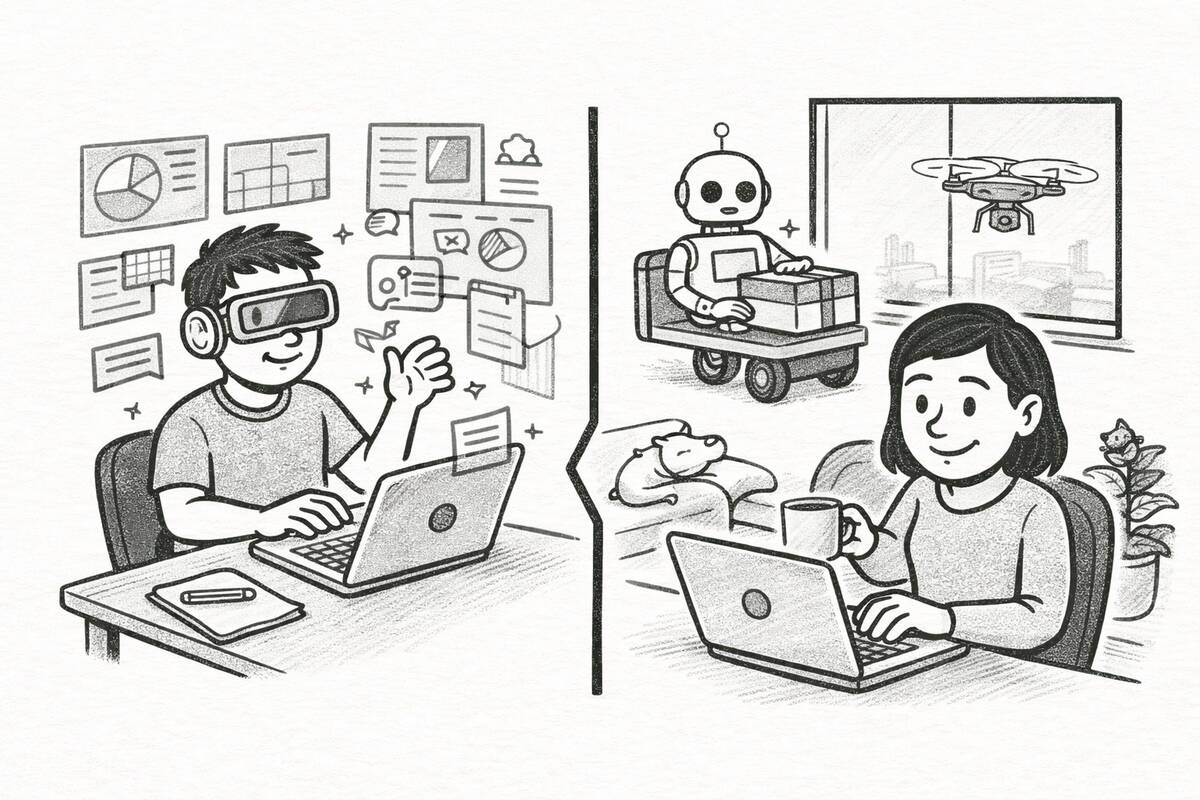So, About That Digital Gold Rush…
Every time I open LinkedIn these days, it feels like I’ve stumbled into a sci-fi convention that’s gotten way, way out of hand. Everyone’s a “Head of Metaverse Futures” or a “Decentralized Autonomous Organization Shepherd.” Seriously, I saw that one last week. Shepherd. You’ve got to be kidding me. It’s a relentless barrage of jargon-laced optimism that promises to fundamentally rewire the very fabric of society, commerce, and—most importantly for the people writing these profiles—our careers.
This is Web3. The supposed next chapter of the internet.
And the big question hanging in the air, thick and heavy like the smell of ozone after a lightning strike, is a simple one: Is this whole thing for real? Are we on the cusp of a job creation boom not seen since the dawn of the internet itself, or is this just the most elaborate, technically sophisticated game of three-card monte the world has ever seen?
It’s a binary choice that’s frankly, a little insulting. The answer isn’t a simple yes or no. It’s a messy, chaotic, and fascinating “maybe, but.”
Let’s get one thing straight from the jump. The amount of outright, unapologetic garbage floating around in the Web3 space is staggering. It’s a grifter’s paradise. For every genuinely interesting project trying to solve a real problem (and there are a few), there are a hundred copy-paste NFT projects promising holders the moon while the anonymous founders are already booking one-way tickets to a country with no extradition treaty. The barrier to entry for launching a token or a “revolutionary” new platform is basically zero, which means the signal-to-noise ratio is just… abysmal. It’s deafeningly noisy.
Remember the ICO boom of 2017? It was a feeding frenzy. Seemingly anyone with a half-baked whitepaper and a vague connection to blockchain could raise millions. Most of it, as we now know, went up in smoke. Web3 feels like that, but on steroids and with a slicker marketing budget.
So when people scream “scam,” they’re not always wrong. They’ve seen the rug pulls. They’ve seen the celebrity-endorsed pump-and-dumps that collapse moments after the check clears. They’ve tried to understand “yield farming” and rightly concluded it sounds more like a cult than a financial strategy. Their skepticism isn’t just warranted; it’s a necessary survival mechanism.
Everyone’s a “Visionary” Now
The language doesn’t help. We’re “building in public,” “fostering decentralized communities,” and “disrupting legacy systems.” It’s a corporate-speak smoothie blended with a heavy dose of techno-utopianism. Sometimes, it just means they’re running a Discord server and haven’t figured out a business model yet.
But—and this is a big but—to dismiss the entire movement because of the scammers is like dismissing the entire internet in 1999 because of Pets.com. It’s a mistake. A huge one. Beneath the thick, frothy layer of hype and fraud, something genuinely different is being built. And when things are built, people are needed to build them. That means jobs. Real ones. With paychecks and everything.
Okay, But Are People Actually Getting Paid?
Yes. Emphatically, yes. The demand for people who can actually navigate this brave new world is, for lack of a better word, insane. And it goes so much deeper than just the hardcore coders.
The obvious starting point is the developers. These are the architects of Web3. People who can write smart contracts in languages like Solidity or Rust are the new rock stars. They command astronomical salaries because they are the tiny handful of people who can actually build the bridges to this new frontier. Companies, from scrappy startups to behemoths like JP Morgan, are falling over themselves to hire them. This isn’t a fluke; it’s a fundamental supply and demand problem. There’s a massive shortage of talent. A report from the venture capital firm Andreessen Horowitz (a16z), which you can eyeball here, has consistently pointed out that while the number of developers is growing, it’s nowhere near fast enough to keep up with the explosion of interest and investment.
These aren’t just make-work jobs. They’re incredibly complex. You’re not just building a website; you’re designing miniature, self-executing economies. One misplaced semicolon in a smart contract can—and has—led to hundreds of millions of dollars being lost forever. The stakes are absurdly high, and so is the compensation.
Not Just for Code Monkeys
But here’s the part that most people miss: the tech is only one piece of the puzzle. A very small piece, in some ways. For every developer writing a smart contract, you need a whole ecosystem of people to make that contract actually do something useful or interesting.
Think about it. A decentralized application (dApp) doesn’t just need flawless code. It needs:
- UI/UX Designers: How do you make interacting with a blockchain—a fundamentally weird and unintuitive process—feel simple and safe for a normal person? This is a massive design challenge. It’s a greenfield of opportunity for designers tired of making the same old mobile apps.
- Community Managers: This might be the most quintessentially Web3 job there is. Since many projects are built around a community of token holders, that community is the lifeblood. They aren’t just customers; they’re owners, evangelists, and your first line of defense. Managing a Telegram or Discord server with thousands of passionate, financially-invested people is a full-time, high-stakes, emotionally draining job that blends marketing, customer support, and group therapy.
- Marketers and Storytellers: You can’t just say “our product is great.” You have to build a narrative, a lore, around your project. You have to explain incredibly complex ideas (What is a ZK-rollup? Why should I care about on-chain governance?) in a way that gets people excited. This is a job for communicators, writers, and brand strategists.
- Legal Experts: Good luck. The regulatory landscape is a minefield, shifting constantly from country to country. Lawyers who can specialize in crypto and digital assets are in a booming field, trying to fit a square peg of decentralized technology into the round hole of centuries-old legal frameworks.
- Tokenomics Experts: These are the economists of Web3. They design the incentive structures that make a decentralized network function. How many tokens should exist? How are they distributed? How do you encourage good behavior and punish bad actors within the system? It’s a fascinating blend of game theory, economics, and psychology.
The list goes on. Product managers, business development leads, security auditors, data analysts… these are all roles that have direct parallels in the “normal” tech world but require a completely new way of thinking in the context of Web3.

The Elephant in the Room: It’s a Freaking Casino
So, we’ve established there are real jobs. Lucrative ones, even. But let’s not get carried away. The entire space is built on a foundation of face-melting volatility.
Working in Web3 today is like being a shipbuilder in the 16th century. There’s a huge demand for your skills to build vessels for long, speculative journeys to the New World. You might get paid handsomely in gold for your work. But the ship you just built might also sink in a storm two weeks out of port, or the captain might turn out to be a pirate, or the land they discover might be a barren rock.
“The market cycles in crypto are brutal and unforgiving. During a bull run, it feels like the party will never stop. Money flows like water, and every idea, no matter how dumb, gets funded. In a bear market—a ‘crypto winter’—it all vanishes. Projects die overnight. Layoffs are sudden and deep. It’s not for the faint of heart.”
This isn’t your stable, 9-to-5 job at a company that’s been around for a century. The project you pour your heart and soul into for a year could become completely worthless in the span of 48 hours because of a market crash, a hack, or just a general loss of interest. That’s a tough pill to swallow. A recent deep-dive by McKinsey, a firm not exactly known for its radical takes, highlights the sheer scale of investment pouring in, but even they caution that real, mainstream adoption is a long, winding road away. It’s a testament to the fact that while the money is real, the stability is…aspirational.
The “scam” element rears its ugly head here again. It’s not just about the outright frauds. It’s about the projects that are well-intentioned but poorly conceived. Projects with no sustainable business model, propped up entirely by the hope that their token price will keep going up. When the music stops, people lose jobs. It’s that simple.
A Quick Confession: I Thought This Was All Bull… for a While
Look, I’m a natural skeptic. For years, I put blockchain in the same mental bucket as flying cars and perpetual motion machines. A neat idea on paper, but practically useless and mostly championed by weirdos. I saw Bitcoin as a novelty and everything that came after it as a derivative, even sillier distraction.
What changed my mind wasn’t a get-rich-quick story. It was a project called Helium.
The idea is simple, almost elegant. They want to build a decentralized wireless network for Internet of Things (IoT) devices—your smart dog collar, the temperature sensor on a farm, that kind of thing. Instead of a big telco like AT&T building all the towers, they let regular people set up small hotspots in their homes. In return for providing network coverage, the hotspot owners earn a crypto token.
Suddenly, it clicked. It wasn’t about the token price. It was about using an incentive—the token—to motivate thousands of disconnected people to cooperate and build a piece of real-world, useful infrastructure. Could it fail? Absolutely. But it was the first time I saw blockchain being used to solve a coordination problem in a way that would be almost impossible with a traditional, centralized company. It felt… new.
And it made me realize that the jobs being created weren’t just about speculating on digital fluff. They were about building new kinds of businesses, new kinds of infrastructure, powered by new kinds of incentives.
Beyond the Hype: What If It Actually Sticks?
So let’s zoom out. If we can filter out the 99% of nonsense, what’s left? What’s the big, audacious promise that makes smart people willing to risk their careers on this stuff?
It comes down to a few core ideas: ownership, decentralization, and composability.
For the last twenty years, we’ve been digital serfs living on land owned by a few feudal lords—Facebook, Google, Amazon. We create the content, we provide the data, and they sell it. Web3, at its most idealistic, is a peasant revolt. It’s the idea that users and creators should own a piece of the platforms they contribute to. The jobs it creates are therefore not just employee roles, but also owner roles. The creator economy becomes the owner economy.
The potential here is genuinely profound. Imagine a social media platform where the most influential creators have a direct say in governance. Imagine a music streaming service where artists receive a micropayment every single time their song is played, directly and instantly, without a dozen middlemen taking a cut. These are the kinds of models being explored, and they require a workforce that understands this new paradigm.
The Jobs We Haven’t Even Invented Yet
This is where it gets really fun to speculate. If this trend continues, we’re going to see job titles that sound like science fiction today.
- DAO Conflict Resolution Specialist: Decentralized Autonomous Organizations are groups of people who coordinate and govern themselves based on rules encoded on a blockchain. But what happens when humans, being humans, disagree? You’ll need people who are part mediator, part diplomat, part psychologist to resolve disputes when there’s no central CEO to make the final call.
- Digital Asset Curator: As people accumulate more and more valuable digital assets—NFTs, in-game items, tokens—they’ll need trusted advisors to help manage, secure, and even display them. Think of it as an art advisor for the digital world.
- Smart Contract Auditor: This job already exists, but it will become as fundamental as a financial auditor is today. These are the people who stress-test the code of a new financial protocol to make sure it can’t be exploited, saving millions in the process.
So, is Web3 a scam? Sometimes, absolutely. Without a doubt. Is it creating real jobs? You bet. Lucrative, interesting, and terrifyingly volatile ones. The mistake is thinking it has to be one or the other. It’s both. It’s a messy, chaotic, and often ridiculous revolution in progress, churning with fraud and opportunity in equal measure.
The real question isn’t if you should pay attention. It’s how you separate the signal from the god-awful, deafening noise. And that, my friend, is a full-time job in itself.
You might also like: The Science of Focus: How to Actually Get Work Done in 2026









